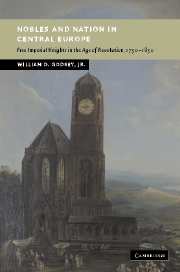Book contents
- Frontmatter
- Contents
- Preface
- Abbreviations
- Introduction
- 1 Wealth and noble autonomy: the Free Imperial Knights in Mainz on the eve of revolution
- 2 Nobles becoming Germans: the transformation of a concept
- 3 Nobles becoming Germans: the destruction of a “geo-cultural landscape”
- 4 Between destruction and survival: knights on the Middle Rhine 1750–1850
- 5 The past recaptured: knights in the Hapsburg Empire 1792–1848
- 6 From cathedral canons to priests: the Coudenhoves and the “Catholic revival”
- 7 The beginnings of conservative German nationalism: the “naturalization” of Baron Carl vom und zum Stein (1757–1831)
- Conclusion
- Appendix: Families of Free Imperial Knights (1797)
- Bibliography
- Index
5 - The past recaptured: knights in the Hapsburg Empire 1792–1848
Published online by Cambridge University Press: 01 October 2009
- Frontmatter
- Contents
- Preface
- Abbreviations
- Introduction
- 1 Wealth and noble autonomy: the Free Imperial Knights in Mainz on the eve of revolution
- 2 Nobles becoming Germans: the transformation of a concept
- 3 Nobles becoming Germans: the destruction of a “geo-cultural landscape”
- 4 Between destruction and survival: knights on the Middle Rhine 1750–1850
- 5 The past recaptured: knights in the Hapsburg Empire 1792–1848
- 6 From cathedral canons to priests: the Coudenhoves and the “Catholic revival”
- 7 The beginnings of conservative German nationalism: the “naturalization” of Baron Carl vom und zum Stein (1757–1831)
- Conclusion
- Appendix: Families of Free Imperial Knights (1797)
- Bibliography
- Index
Summary
“My youngest son was born in 1811 … in Vienna and thereby belongs to the happy Austrian Monarchy. He is being brought up in Prague so as not to be infected by the spurious notions of freedom and constitutions in our German schools and universities and to prepare himself for the same service as his two older brothers expect to enter after attending the military academies in Vienna and [Wiener] Neustadt. In Germany, the secularization and the abolition of the Teutonic Order and the Order of Malta have ruined the chances of young noblemen, just as the end of the imperial constitution (Reichsverfassung) has undermined and decreased the fortunes of their parents. Only in the [Hapsburg] Monarchy, fortunately ruled by Your Imperial Royal Majesty, are there prospects for a father trying to provide for his children.”
Baron Carl Hacke to Emperor Francis, Bamberg, March 18, 1821, HHStA, Staatskanzlei, Baden, Korrespondenz 1821, carton 19.If the marriage of Count Philipp Franz Stadion-Thannhausen (1780–1839) to Countess Kunigunde Kesselstatt (1794–1872) had not taken place in the late summer of 1815 in the picturesque wine-growing village of Döbling near Vienna, it could well have taken place a few decades earlier in the fading years of Electoral Mainz. Both bride and groom came from there and both descended from the flower of the immediate imperial nobility that had dominated the Rhenish ecclesiastical states and that was well represented by the couple's eight witnesses: Count Erwein Schönborn-Buchheim (1791–1864), Prince Franz Georg Metternich-Winneburg-Ochsenhausen (1746–1818), Baron Wilhelm Kerpen (1741–1823), Count Franz Schönborn-Buchheim (1768–1841), Countess Sophie Stadion-Thannhausen-Wambolt (1757–1843), Count Philipp Stadion-Warthausen (1763–1824), Count Joseph Pergen (1766–1830), and Count Friedrich Stadion-Thannhausen (1774–1820).
- Type
- Chapter
- Information
- Nobles and Nation in Central EuropeFree Imperial Knights in the Age of Revolution, 1750–1850, pp. 141 - 186Publisher: Cambridge University PressPrint publication year: 2004

